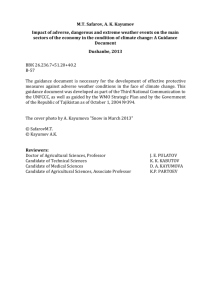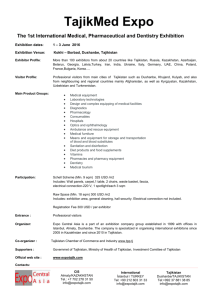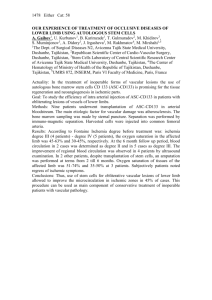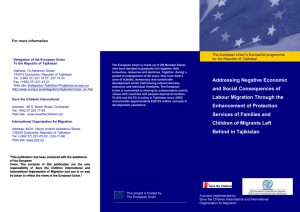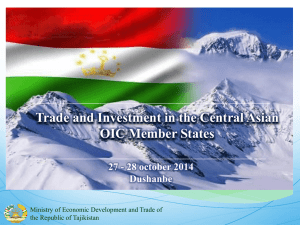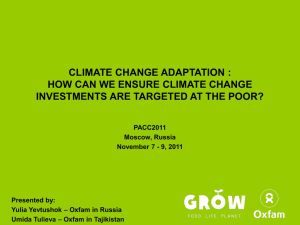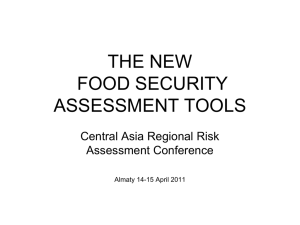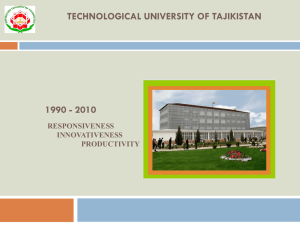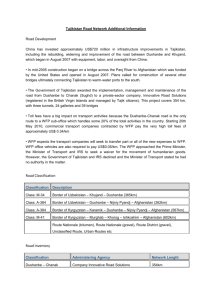DOC - IFC
advertisement
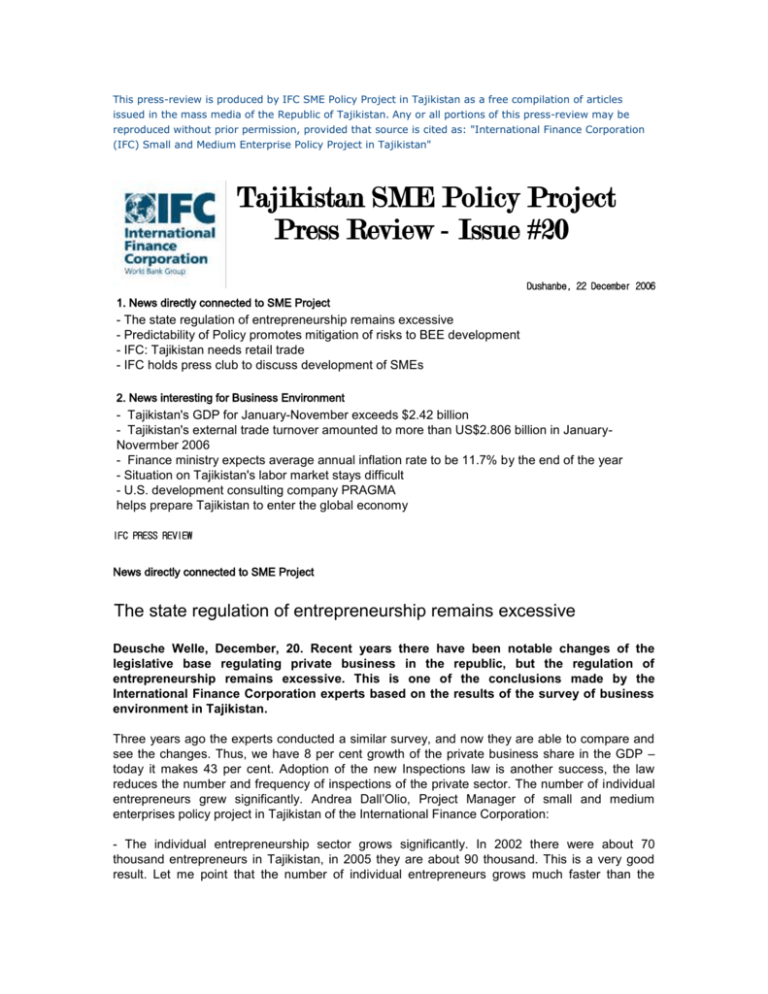
This press-review is produced by IFC SME Policy Project in Tajikistan as a free compilation of articles issued in the mass media of the Republic of Tajikistan. Any or all portions of this press-review may be reproduced without prior permission, provided that source is cited as: "International Finance Corporation (IFC) Small and Medium Enterprise Policy Project in Tajikistan" Tajikistan SME Policy Project Press Review - Issue #20 Dushanbe, 22 December 2006 1. News directly connected to SME Project - The state regulation of entrepreneurship remains excessive - Predictability of Policy promotes mitigation of risks to BEE development - IFC: Tajikistan needs retail trade - IFC holds press club to discuss development of SMEs 2. News interesting for Business Environment - Tajikistan's GDP for January-November exceeds $2.42 billion - Tajikistan's external trade turnover amounted to more than US$2.806 billion in JanuaryNovermber 2006 - Finance ministry expects average annual inflation rate to be 11.7% by the end of the year - Situation on Tajikistan's labor market stays difficult - U.S. development consulting company PRAGMA helps prepare Tajikistan to enter the global economy IFC PRESS REVIEW News directly connected to SME Project The state regulation of entrepreneurship remains excessive Deusche Welle, December, 20. Recent years there have been notable changes of the legislative base regulating private business in the republic, but the regulation of entrepreneurship remains excessive. This is one of the conclusions made by the International Finance Corporation experts based on the results of the survey of business environment in Tajikistan. Three years ago the experts conducted a similar survey, and now they are able to compare and see the changes. Thus, we have 8 per cent growth of the private business share in the GDP – today it makes 43 per cent. Adoption of the new Inspections law is another success, the law reduces the number and frequency of inspections of the private sector. The number of individual entrepreneurs grew significantly. Andrea Dall’Olio, Project Manager of small and medium enterprises policy project in Tajikistan of the International Finance Corporation: - The individual entrepreneurship sector grows significantly. In 2002 there were about 70 thousand entrepreneurs in Tajikistan, in 2005 they are about 90 thousand. This is a very good result. Let me point that the number of individual entrepreneurs grows much faster than the number of small and medium companies. The situation, undoubtedly, changed for the better. But it might be even better. Along with that, the business environment in Tajikistan is characterized by the majority of buyingselling and service rendering businesses, but not by manufacturing goods. Being an agricultural country, Tajikistan imports from abroad even diary and meat products. Alisher Isaev, the Economy Policy Advisor: - If we look at the preliminary results of the survey, we will see that the major part of entrepreneur operate in the sphere of service, trade and agriculture, the number of those engaged into manufacturing is notably fewer. This is very simple to explain. Trade and service gives faster profit than manufacturing goods. The registration of small and medium industrial enterprises also is a kind of hinder, observes Alisher Isaev: - Today the activity of small and medium business is considerably regulated by the state, and there is a need for improvement of the administrative regulation in the fields of issuing permits, streamlining the registration of small and medium enterprises. So far it is a multistage and very complicated procedure. The experts believe a transparent system of the state regulation and low corruption to be one of the favourable conditions for the development of provate entrepreneurship. But everything goes “upside down” in Tajikistan: the majority of the entrepreneurs have to make unofficial payments to enable themselves to work without problems. A private entrepreneur from a high mountain Murgab rayon of Tajikistan told the Deutsche Welle how it happens: - To get a loan from our bank an individual have to “share”. Without this he shall not get any loan. For example, if one processes the loan of TJS 5 thousand, the bank officials leave TJS 500 with them and the person received TJS 4.5 thousand. Also we are constantly facing the corruption in the law-enforcement bodies, the worst of it is related to the prosecutor of the rayon. Those who suffered from his actions are about to organize a group and to write to the newspapers. But I am not sure if they will do it. Because the people are afraid. They think the same outrage happens not only at the level of rayons, at the level of oblasts and the republic, too. And they think that the problem may not be resolved to their advantage, but on the contrary, they will have worse troubles. Many facts of extortion remain unknown and the corrupted officials unpunished because the entrepreneurs are afraid of endangering their business. N.Bukhari-zade Find the original Russian version of radio report here. The article is published also on Asia-Plus website here. Predictability of Policy promotes mitigation of risks to BEE development Asia-Plus, December 19. Predictability of policy and ensuring rights of property promote mitigation of risks to development of business enabling environment in Tajikistan, Andrea Dall'Olio, Manager of International Finance Corporation’s (IFC) Tajikistan Small and Medium Businesses (SME) Development Project, remarked at a press club in Dushanbe on December 18. According to him, amount of investments, creation of jobs and further development of company depend on an amount of profit, which, in turn, depends on expenditures, risks and competition barriers, and state is able to impact each of these three factors to considerable extent. The IFC’s project manager noted that by removing regulatory constraints, bureaucracy, alleviating tax burden, reducing inflation rate and regulating the labor market the state might decrease expenditures. Through predictable policy the state may mitigate risks and ensure rights of property. As far as competition barriers are concerned, they could be diminished through implementation of the competition law, access to financial infrastructure and regulating the beginning of activity bankruptcy procedure. Dall'Olio stressed small and medium businesses promote formation of competitive environment, economic growth and employment of the population in the country. As a whole, small and medium businesses are developing in Tajikistan, according to him. On the development of the individual entrepreneurship, IFC’s project manager noted that it is developing considerably in the republic. If by the end of 2002, only 70,000 individual entrepreneurs had been reported in Tajikistan, by the beginning of 2005, their number had reached 90,000. Besides, over the past four years, a share of small and medium enterprises in the gross domestic product ha increased from 35 percent in 2002 to 43 percent in 2005. “”Over the past years, considerable changes have taken place in a procedure of registration, which at present takes less than a week,” said Dall'Olio, “However, we have to work on improvement of the business environment in Tajikistan. We still have what to change the situation.” In the beginning of the next year, IFC plans to bring out the second report on development of the business environment in Tajikistan and conduct survey on implementation of law on inspection of economic entities. IFC’s Tajikistan SME Development Project’s goal is to support the development of small and medium business (SMEs) and to increase investment in the private sector through improvement of Tajikistan’s business enabling environment. A December 18 press club was dedicated to discuss the present state of the business environment in the republic. Experts and specialists participating in the press club touched upon issues related to various factors impacting small and medium businesses, legal foundation of development of business enabling environment in Tajikistan. IFC: Tajikistan needs retail trade Information agency "Avesta", December 19. Tajikistan needs retail trade and its developing. Andrea Dall’Olio, Project Manager of the IFC Small and Medium Enterprises Policy Project in Tajikistan stated it at the press club devoted to the status of the business environment in Tajikistan. ‘The project objective is to improve the environment for the local entrepreneurs, to assist the country in attracting foreign investments, in developing the law drafts aimed at reduction of the corruption and at giving equal rights and protecting the business environment’, said Andrea Dall’Olio. ‘The sphere of small and medium business in Tajikistan provokes formation of the competition, the economy development and employment of the population’. The project manager said that the improvement of the business environment covers registration, licensing and permits (the right for carrying out certain actions and activities), inspection, access to finance, export-import, etc. The volume of investments, creating jobs and development of a form depends on the profit. The profit, in its turn, depends on the costs, risks and competition. ‘We see the results. For example there are considerable changes in the field of registration: it takes less than a week to register as an individual entrepreneur’, added Andrea Dall’Olio, ‘the growth of small and medium business share in the GDP made 43% in 2005, while in 2002 it made 35%’. The Tajik legislation, as noted by Alisher Isaev, the IFC economy policy advisor, does not give the definition of small and medium entrepreneurship. ‘The major part of the small and medium business is engaged in trading, service rendering and agriculture, and the minor part deals with manufacturing’, he said, adding that this fact makes the regulation of entrepreneurship much more difficult. ‘We distinguish five principles to be met by a modern regulatory system. They are reliability, transparency, legality, effectiveness and efficiency’, observed Andrea Dall’Olio. Early next year the IFC intends to issue a second report on the business environment in Tajikistan and to conduct a survey of the implementation of the Inspections law’. Also it was mentioned that in 2005 the average receipts of small and medium enterprises made TJS 17 thousand 90 for individual entrepreneurs, TJS 30 thousand 900 for dehkan farms, TJS 216 thousand for small and medium enterprises. Find the original Russian version of the article here. IFC holds press club to discuss development of SMEs Asia-Plus, December 18. The Dushanbe Office of International Finance Corporation (IFC) is holding a press club in Dushanbe today. Polina Pilyugina, the IFC Dushanbe Office business development advisor, said that the press club is being held as part of the “Development of Small and Medium Businesses in Tajikistan” project and dedicated to discuss the present state of the business environment in the Republic. According to her, experts and specialists participating in the press club will touch upon issues related to various factors impacting small and medium businesses, legal foundation of development of favorable business environment in Tajikistan. Find also the same announces at Radio Voice of Russia website here and at SNG and Baltia website here.
